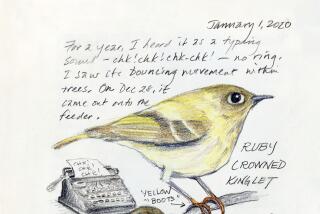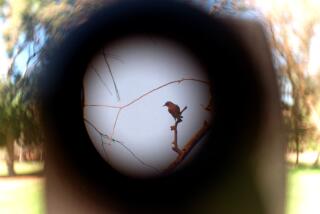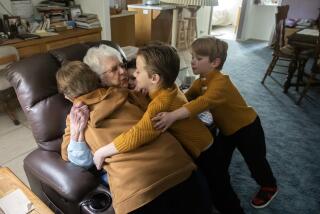Helping Kids’ Confidence Take Flight : Psychology: An office menagerie of eight birds and a dog gives troubled children a way to express themselves, therapist says.
CLAREMONT — The troubled boy would not speak at preschool and barely spoke to his parents.
But he broke his silence for a conyer named Tilly who squawked a greeting in a doctor’s office: “Pretty baby, hello. Pretty baby, hello.”
“Hello,” the 4 1/2-year-old answered shyly.
He talked to the bird, he explained, “because the bird talked to me first.” And from that time on, the boy kept talking to Dr. Aubrey Fine.
Dr. Doolittle may have talked to the animals, but Fine uses the animals to talk to the children, helping them relax, gain confidence and express themselves.
The Claremont psychologist uses a menagerie of birds and a golden retriever named Puppy to treat children with medical and emotional problems, especially those who are hyperactive or have attention deficit disorder, a condition in which patients have trouble focusing their attention for extended periods of time.
Fine got the idea of using birds five years ago, when he was looking for a way to help children feel more comfortable in his office.
“Compassion and humanism are important ingredients to give children, and animals do it better,” said Fine, 37, who teaches classes on social work at Cal Poly Pomona and is director of the Center for Special Populations, a campus program that promotes understanding of the needs and rights of the physically and mentally disabled.
Fine selected birds that are gentle and like to interact with people. Eight usually wander around the office.
Starlight, a cockatoo, likes to cuddle and kiss. Tikva, the other cockatoo, divides her time between Fine’s home and office. Two lovebirds, three cockatiels and Sunshine, a conyer, which resembles a large parrot, round out the menagerie.
Birds “have a presence to them and bring a sense of calmness. You can’t jump around in front of birds,” Fine said.
The mother of two of Fine’s patients--8-year-old twins, one of whom has attention deficit disorder--says the birds have helped her sons develop relationships with people.
“You can’t push yourself on a bird, and you pick that up with people,” said the woman, who asked that her name not be used.
The birds have been important therapy tools in ways that surprised even Fine. When he told an 8-year-old girl seeing him for attention deficit disorder that it is important always to ask a bird’s permission before petting it, she gave a knowing look and admitted for the first time that she had been molested. He referred the case to the county Department of Children’s Services.
Fine teaches his young patients how to care for the birds, helping them to build confidence and a sense of responsibility.
“When a bird enjoys being with you, it lets you know. . . . There’s a feeling of great pride in that,” Fine said.
Sometimes Fine allows the children to take the bird home or to school.
“The children realize they are respected and trusted because they are being loaned a valuable bird. Being with the bird makes the child stand out and receive recognition, which improves social contacts and enhances self-esteem,” he said.
Dr. Michael Whiting, a Covina pediatrician, said he has referred children to Fine because he “just knows how to relate to the kids. He can gain rapport within minutes.”
The birds help build rapport, but Fine is quick to point out that they are just one of the strategies he uses, along with conventional therapy, to help patients build self-esteem.
“To say that any relationship with an animal will offer a whole answer would be misleading,” he said.
But printed on his stationery is Fine’s belief that “there are only two lasting bequests we can hope to give our children. One of these is roots; the other wings.”
“Birds,” he said, “help provide the wings.”
More to Read
Sign up for Essential California
The most important California stories and recommendations in your inbox every morning.
You may occasionally receive promotional content from the Los Angeles Times.










